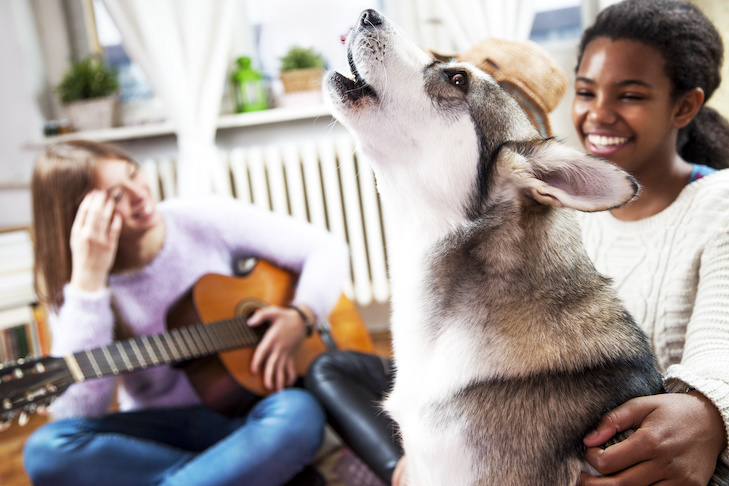Some dogs take to music right away, even howling along to their favorite tunes. Other dogs tend to retreat from these sounds in fear. The fact that pleasant sounds can capture a dog’s attention is something people know intuitively and science confirms it.
If you listened to a recording of dogs and their owners, you’d probably hear what is known as motherese or baby talk (e.g. “Gimme kissies”). People tend to adjust their volume and cadence when speaking to their dogs. And dogs take notice, barking or wagging their tail in excitement.
Studying how animals perceive sound is the focus of an entire field called bioacoustics. Sound researchers have teamed up with musical composers to develop soothing melodies that can relieve stress in dogs. Before adding music into your dog’s life, it helps to know how dogs use sound to navigate their world.
Knowing What Dogs Hear
Sound travels through the air as waves of energy. Hertz (Hz) is a unit of frequency that measures the number of wave cycles per second. Humans can hear sounds between 20 and 20,000 Hz. Dogs’ ears are much more sensitive, picking up frequencies between 40 and 65,000 Hz.
From an evolutionary perspective, dogs’ exceptional hearing is beneficial for detecting predators. However, in today’s world, loud or unexpected sounds can overwhelm a dog’s nervous system. Along with feeling anxious about thunderstorms and fireworks, dogs can become fearful of everyday sounds that people hardly notice:
- Vacuum cleaner
- Lawn mower
- Sirens and car alarms
- Electronic rodent repellent
- Smoke detector
- Kitchen appliances
- Washer and dryer
- Furnace
- Air conditioner
- Alarm clock
- Jangling keys and dog tags
- Skateboards on pavement
- Construction work
- Garbage truck

How to Reduce Noise Pollution at Home
With repeated exposure to grating noises, some dogs may develop sound phobias. Fortunately, there are things you can do to cut down on noise pollution in and around your home:
- Turn off or unplug devices when not in use.
- Install weather stripping and double-paned windows.
- Update appliances and choose energy-efficient options.
- Install noise-absorbing surfaces such as area rugs or carpet tiles.
- Choose an alarm clock that uses light instead of sound.
- Make sure wall outlets are properly sealed.
- Create a quiet space in your home with no electronic devices.
- Block sound using wall insulation, decorative blankets, artwork, blinds, drapes, bookcases, and large plants.
Although it’s not possible to eliminate noise pollution entirely, you can introduce positive sounds into your living space. This is where music comes in, promoting calm and relaxation.
How Different Types of Music Affect Your Dog
Decades of research point to the stress and pain-relieving effects of music for people. Based on this work, animal researchers wanted to see if dogs could also benefit from music. Most of these studies have taken place in animal rescue shelters where researchers record how dogs behave in response to music and note any changes in the stress hormone, cortisol.
In one study, Dr. Deborah Wells, psychologist, found that dogs appeared less agitated after listening to selections of classical music. Their breathing slowed and they were less likely to pace around or remain standing. Heavy metal music had the opposite effect while pop music made little difference.
Similarly, Dr. Lori Kogan, psychologist, reported that dogs exposed to classical music spent more time sleeping and less time barking. Dogs exhibited tremors and shaking after listening to heavy metal music.
Apart from the genre, the length and frequency of a note affect how dogs respond to music. Short notes played in quick succession led to rapid motor movements. Dogs appeared calm in response to simple tones, rhythms, and sustained notes.

The innovative work of Dr. Alfred Tomatis, otolaryngologist, is the basis for audio sound therapies designed for dogs. These soothing melodies trigger immune responses that help with repairing tissue and fighting infection.
For instance, iCalmPet products use musical arrangements to help restore balance to a dog’s nervous system. Sharon Howarth-Russell, composer, creates compositions for dogs to address specific needs such as alleviating anxiety, car sickness, aggression, or illness.
Spotify has a tool that allows you to create a pet playlist for your dog. How it works is you select the traits that best describe your dog’s personality. You can also add your dog’s name and upload a photo for the playlist cover.
Dogs appear most calm when listening to classical music, reggae, and soft rock. In addition to genre and rhythm, variety is key. Dogs tend to tune out music they hear all the time. The relaxing effect declines once music turns into ambient noise.
A relaxed dog is more likely to sleep soundly which benefits their brain and immune health. If your dog experiences separation anxiety, remember to play some tunes when you’re at home so they don’t develop an association between music and you leaving the house.
Furthermore, music has a variety of therapeutic uses. It can help dogs remain calm while adjusting to a new home, attending a veterinary appointment, recovering from surgery, or preparing for the end of life. In a world that’s filled with noise from cars and electronic devices, music is a welcome reprieve for you and your dog.
This article is intended solely as general guidance, and does not constitute health or other professional advice. Individual situations and applicable laws vary by jurisdiction, and you are encouraged to obtain appropriate advice from qualified professionals in the applicable jurisdictions. We make no representations or warranties concerning any course of action taken by any person following or otherwise using the information offered or provided in this article, including any such information associated with and provided in connection with third-party products, and we will not be liable for any direct, indirect, consequential, special, exemplary or other damages that may result, including but not limited to economic loss, injury, illness or death.

